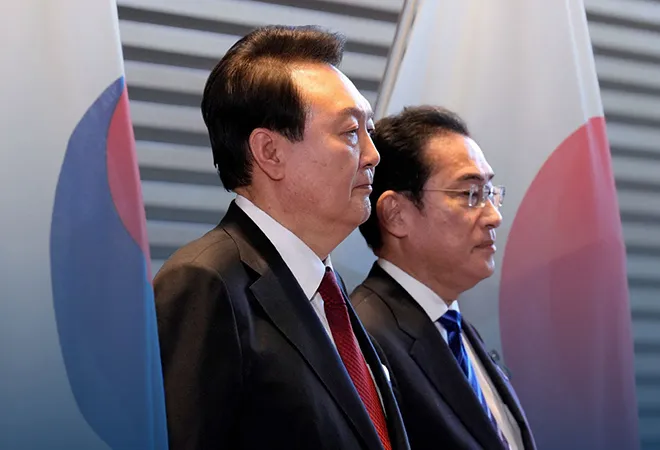
After 12 years, Tokyo and Seoul held their first bilateral meeting in March, which is indicative of a clear sign that both are looking to actively mend and accelerate bilateral ties. Objectively, given the extent of the historical baggage and the record of unsuccessful past attempts at rapprochement, it would not be prudent to assume that the bilateral meeting in March is a sign of a clean break in the long diplomatic impasse. However, the geopolitical context in which the two countries met could prove to be a strong catalyst for crystalising improved ties.
From a difficult history to definitive momentum
Relations between Japan and Korea have been marred by a history of disputes and tensions that date back several centuries. Despite their close geographical proximity, cultural similarities, and periodic efforts made by both sides to improve relations, particularly in recent years, including high-level diplomatic meetings and economic cooperation, the two countries have experienced a number of challenges in their bilateral relationship. While problems such as territorial disputes—the Dokdo/Takeshima islands—remain,
compensation for the victims of Japan's colonial rule has been the most contentious issue with many Korean victims feeling that Tokyo has not taken sufficient measures to acknowledge and apologise for its past wrongdoings. 2018 proved to be a principally challenging year with the
South Korean Supreme Court ordering Japanese companies, Nippon Steel and Mitsubishi Heavy Industries, to sell their assets to compensate Korean forced labour victims. The order was opposed by Japan,
leading to export controls imposed by Tokyo in 2019 in response and further intensification of bilateral acrimony.
The meeting comes close on the heels of Pyongyang stepping up its nuclear weapons programme in recent years and an escalation in geostrategic and geoeconomic uncertainty prompted by China’s advances and aggression in the Indo-Pacific maritime space.
Nonetheless, five years later, the
Yoon-Kishida meeting resulted in both sides agreeing to resume bilateral visits, take steps to resolve the trade dispute, increase security cooperation, and establish greater business linkages. The meeting comes close on the heels of Pyongyang stepping up its nuclear weapons programme in recent years and an escalation in geostrategic and geoeconomic uncertainty prompted by China’s advances and aggression in the Indo-Pacific maritime space. While the regional security landscape has been characterised by these factors earlier as well, the intensity has been redefined. Therefore, both Japan and ROK realised that they stand to benefit from burying the hatchet of past grievances.
Affirmations at the G7 Hiroshima Summit
Following the bilateral meeting, at the recently concluded G7 Summit in Hiroshima, Seoul was invited as an observer for Japan’s Outreach Meetings where the two met bilaterally once again in what was a third meeting within a space of two months. At Hiroshima, President Yoon and Prime Minister Kishida discussed the advancement of bilateral ties, including the
opening of inter-regional air routes and the expansion of bilateral people-to-people exchanges while reiterating the need to work together to address regional security threats arising from China, Russia, and North Korea.
Regarding bilateral security cooperation, the two countries agreed to strengthen their security cooperation by working together to develop new missile defence systems and sharing intelligence and coordinate sanctions as a common approach towards Pyongyang.
What is driving ROK and Japan closer and why it is important
A volatile North Korea, Beijing’s assertiveness and posturing in nearby Taiwan and across the larger region, complex and uncertain regional geopolitics and disruptions in industrial supply chains, amongst others, are some of the driving factors behind the two countries seeking to create a conducive working environment where both can participate more actively. The fact that both countries are being led by pro-US leaders is no less a contributing factor.
Regarding bilateral security cooperation, the two countries agreed to strengthen their security cooperation by working together to develop new missile defence systems and sharing intelligence and coordinate sanctions as a common approach towards Pyongyang.
For countries in the Indo-Pacific, an ROK-Japan rapprochement would greatly augment the efficacy of regional security as well as function-based partnerships. The two countries also discussed reinstating bilateral trade, which would
relieve pressure from global high-tech supply chains. For Washington, it is a no-brainer that Seoul and Tokyo would want to reconcile given the regional unrest. But while many
Koreans and Japanese do feel the same way, Korean labour victims believe such an approach shows both disregard and disrespect towards their suffering.
Yoon had
made it a priority to mend fractured bilateral ties since he assumed leadership and has been working steadfastly towards that end. It is part of his drive to carve and cultivate a more involved role for South Korea in the region and globally. To ensure that this newfound will and momentum are not lost, both Yoon and Kishida must work out a lasting and meaningful solution to the issue of compensation for the victims of Japan’s wartime forced labour. If Yoon can effectively manage the popular dissatisfaction, then politically and diplomatically, closer ties with Japan would be advantageous to both and will help bolster the security architecture of Northeast Asia and the Indo-Pacific. Cooperation between the two could also help to build trust between other countries in the region. However, in the absence of this, closer bilateral ties would always run the risk of developing fractures, hindering what could become a key fulcrum for the development of partnerships in the Indo-Pacific.
Pratnashree Basu is an Associate Fellow with the CNED programme at the Observer Research Foundation
The views expressed above belong to the author(s). ORF research and analyses now available on Telegram! Click here to access our curated content — blogs, longforms and interviews.



 After 12 years, Tokyo and Seoul held their first bilateral meeting in March, which is indicative of a clear sign that both are looking to actively mend and accelerate bilateral ties. Objectively, given the extent of the historical baggage and the record of unsuccessful past attempts at rapprochement, it would not be prudent to assume that the bilateral meeting in March is a sign of a clean break in the long diplomatic impasse. However, the geopolitical context in which the two countries met could prove to be a strong catalyst for crystalising improved ties.
After 12 years, Tokyo and Seoul held their first bilateral meeting in March, which is indicative of a clear sign that both are looking to actively mend and accelerate bilateral ties. Objectively, given the extent of the historical baggage and the record of unsuccessful past attempts at rapprochement, it would not be prudent to assume that the bilateral meeting in March is a sign of a clean break in the long diplomatic impasse. However, the geopolitical context in which the two countries met could prove to be a strong catalyst for crystalising improved ties.
 PREV
PREV


